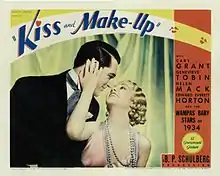Kiss and Make-Up
Kiss and Make-Up is a 1934 romantic comedy film starring Cary Grant as a doctor who specializes in making women beautiful. Genevieve Tobin and Helen Mack play his romantic entanglements. The film was based on the play Kozmetika by István Békeffy (credited as Stephen Bekeffi). All of the WAMPAS Baby Stars of 1934 were cast in roles in the film.
| Kiss and Make-Up | |
|---|---|
 Lobby card showing Cary Grant and Genevieve Tobin | |
| Directed by | Harlan Thompson Jean Negulesco (associate director) |
| Written by | Harlan Thompson George Marion, Jr. Jane Hinton ("adapted by") |
| Produced by | B. P. Schulberg |
| Starring | Cary Grant Genevieve Tobin Helen Mack |
| Cinematography | Leon Shamroy |
| Music by | Ralph Rainger Leo Robin (lyrics) |
Production company | |
| Distributed by | Paramount Pictures |
Release date |
|
Running time | 78 minutes |
| Country | United States |
| Language | English |
Plot
Dr. Maurice Lamar runs a highly successful business in Paris, providing cosmetic surgery and other beauty treatments to women. Old friend Max Pascal visits him to try to borrow money to finish his research, but Maurice turns him down, instead offering him a job, and later a partnership. Max declines.
Maurice unveils the new Eve Caron and declares her perfect. However, her husband Marcel only wants a wife just a bit beautiful, not someone who attracts the attention of every man, so he divorces her. Maurice then marries her himself.
They go to a beauty convention on the Riviera on their honeymoon, accompanied by Maurice's naturally pretty secretary Annie, who secretly yearns for him. However, Eve is so careful about guarding her beauty that all the restrictions she imposes on herself irritate her new husband. Eve takes so long getting ready that they miss the banquet in his honor.
While swimming, Annie meets an appreciative Marcel Caron. They go on a date, and Annie admires Marcel's curly hair. When Marcel later runs into Maurice at a nightclub, he is delighted when he correctly guesses what Eve has put Maurice through, as he had to put up with the same behavior himself.
The honeymoon night turns out to be a disaster. First, Eve complains that she has run out of "cleansing cream" and insists that Annie bring her some more. After Annie brings some, the secretary becomes upset and quits, and Maurice cannot understand why. When Maurice sees Eve ready for bed, with cleansing cream on her face and wearing a hairnet and gloves, he gets himself first another room, then a divorce.
Maurice returns to Paris, only to find his business in shambles without Annie to manage things. He decides to quit cosmetics and conduct research with Max. Annie shows up and informs Maurice that she is going to marry Marcel. Maurice then realizes that he loves Annie. He chases after the couple in a taxi. They both crash. Annie then discovers to her horror that Marcel's curly hair is a toupee. After giving Maurice's hair a good tug, she tells him she loves him.
Cast
- Cary Grant as Dr. Maurice Lamar
- Genevieve Tobin as Eve Caron
- Helen Mack as Annie
- Edward Everett Horton as Marcel Caron
- Lucien Littlefield as Max Pascal
- Mona Maris as Countess Rita
- Rafael Alcayde as Rolando (credited as Rafael Storm)
- Toby Wing as Consuelo Claghorne
- Dorothy Christie as Greta
Listed in the opening credits are "The WAMPAS Baby Stars of 1934":
- Judith Arlen
- Betty Bryson
- Jean Carmen
- Helen Cohan (credited as Helene Cohan)
- Dorothy Drake
- Jean Gale
- Hazel Hayes
- Ann Hovey
- Lucille Lund
- Lu Ann Meredith (as Lu-Anne Meredith)
- Gigi Parrish (as Gi-Gi Parrish)
- Jacqueline Wells
- Katherine Williams
Reception
Andre Sennwald of The New York Times labelled the film a "first-class lingerie bazaar and a third-class entertainment,[1] though he thought that Grant had brought much liveliness to the part. Winthrop Sargent of Variety thought that Grant performed well as the doctor, but was of the opinion that he and Horton overplayed their parts "too strongly for laughs".[2] Pauline Kael later praised Grant's performance and thought that he had used his skills developed in vaudeville to good use in the film, displaying a "sense of fun" with "confident, full-hearted exhibitionism".[3]
References
- Wansell 2013, p. 36.
- Deschner 1973, pp. 74–5.
- Kael 1994, p. 642.
Sources
- Deschner, Donald (1973). The Complete Films of Cary Grant. Citadel Press. ISBN 0-8065-0376-9.
- Kael, Pauline (1994). For Keeps. Dutton.
- Wansell, Geoffrey (December 13, 2013) [1996]. Cary Grant, Dark Angel. Skyhorse Publishing. ISBN 978-1-62872-336-6.